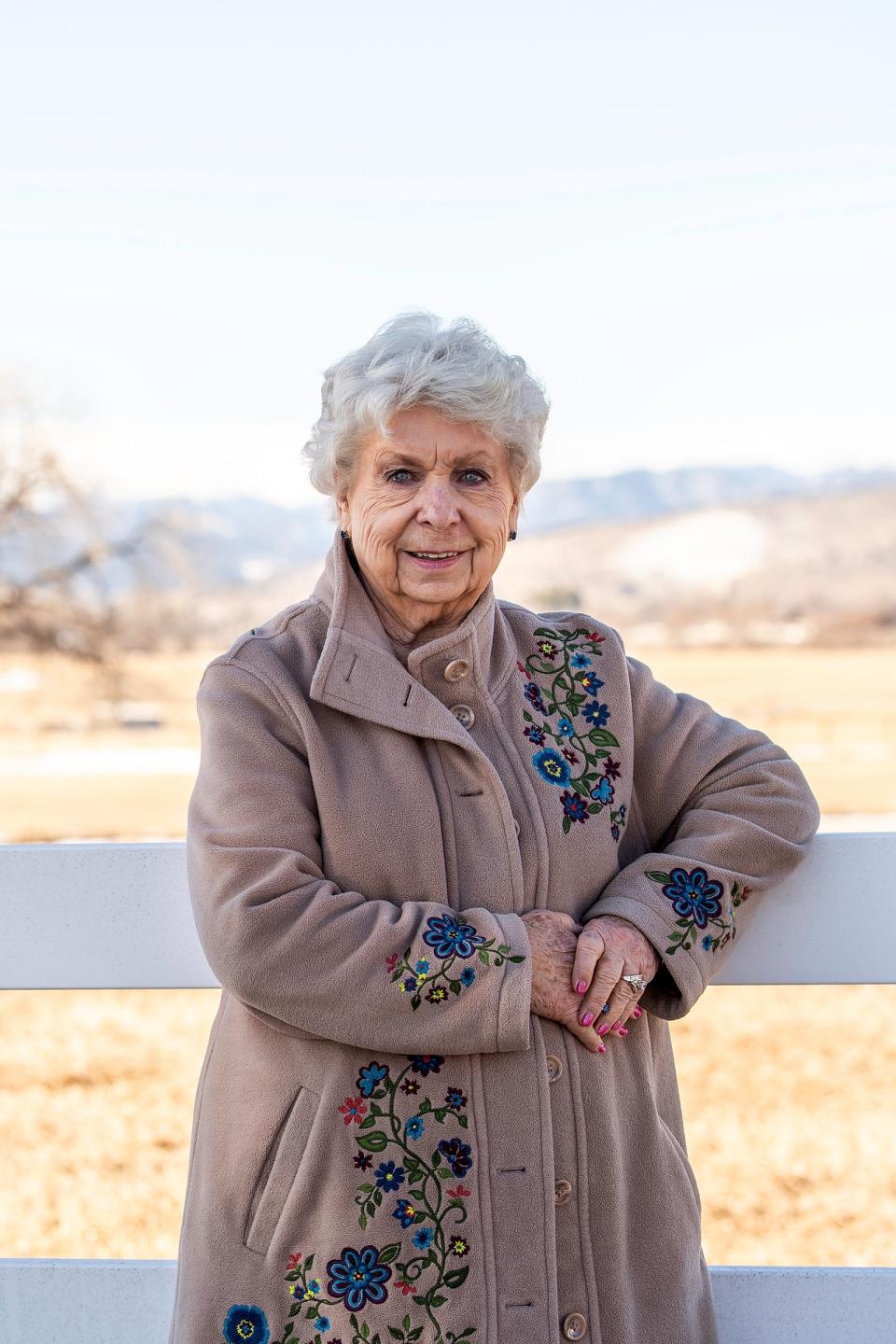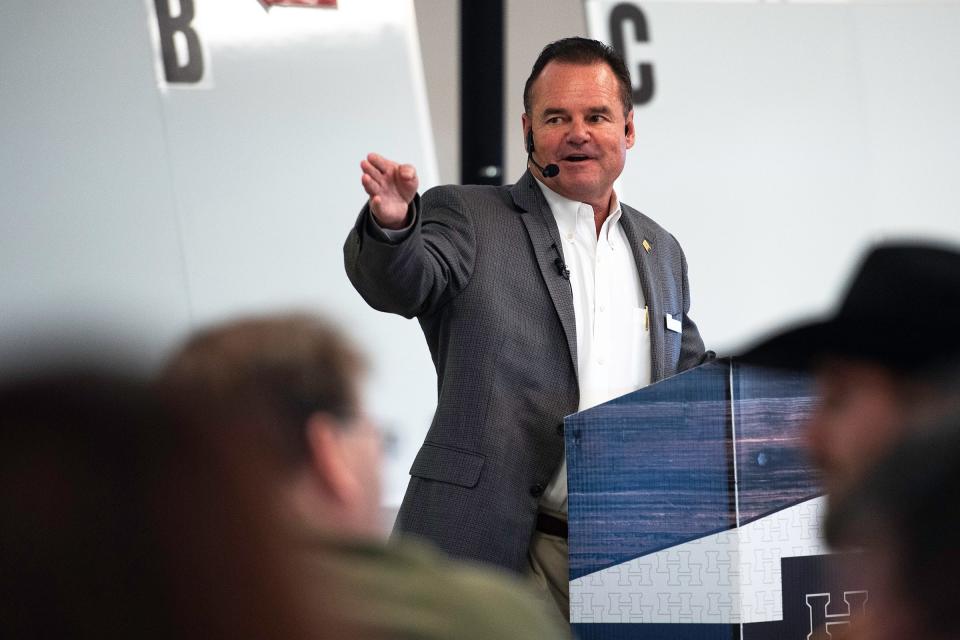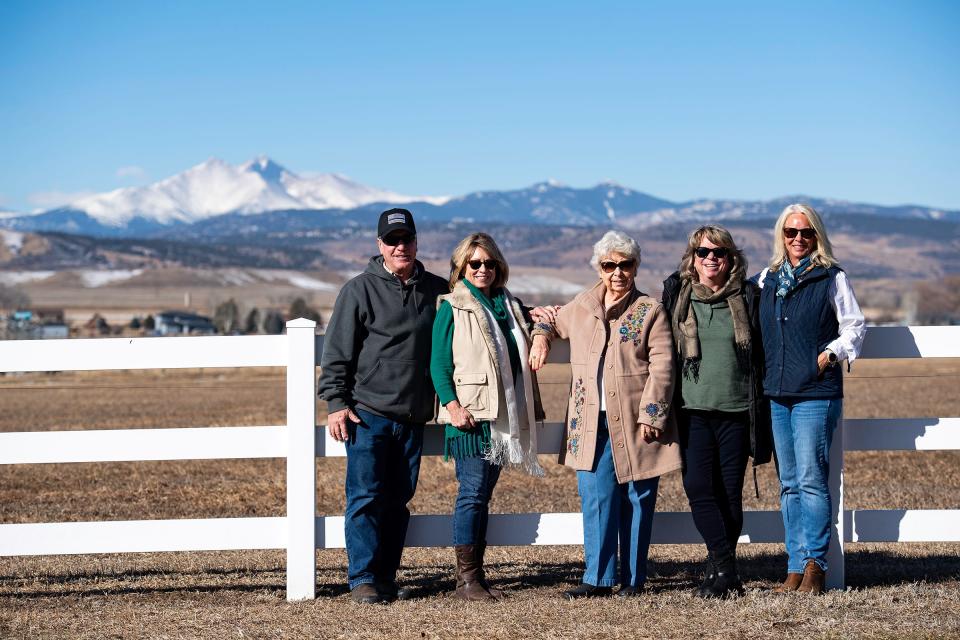'A finite supply': Ex-landowner sells 90 shares of Colorado-Big Thompson water at auction
LONGMONT — From her days as a young wife through the death of two husbands and the challenges of raising a family, Carol Oswald Yoakum drew strength from the majestic Longs Peak visible from her Longmont picture window.
"The first thing I did every morning when I got up was to look to the west," she said.
"The views were always different. The sunrises and sunsets would take your breath away," added Yoakum's son, Alan Oswald.
Through the years, Yoakum acquired 900 acres of farmland north of Longmont where she raised her four children, welcomed the neighbor kids to swim n their lake and ran a thoroughbred training center. After the death of her first husband, Carl, Yoakum (then Oswald) gave up the thoroughbred business and sold the horses. "It wasn't fun anymore."

She married Harvey Yoakum several years later and slowly subdivided some of the land: A couple hundred acres went for a 20-home subdivision, 575 acres were put into a conservation easement with Boulder County so the views she lived with for 57 years would always be protected. She retained 175 acres where she and Harvey grew hay and raised cattle up until his health began to fail.
Now 91, Yoakum sold Meadow Green Farm in March 2023. On Wednesday, the last links to the property — 90 shares of Colorado-Big Thompson water — were auctioned at Boulder County Fairgrounds in Longmont. Fifteen buyers paid an average of $52,481 per share, or $4.72 million, making the water that once nourished the farm as valuable as the land itself.
The relatively rare water auction within Northern Water boundaries was the first of two this month that will ultimately see 186 shares of Colorado-Big Thompson water transition to new hands and new uses. On Wednesday, Yoakum's 90 shares went to ditch companies, developers, farmers, ranchers and one municipality that will use it to add to their water holdings, supply water to new subdivisions and irrigate some farmland.
Michael Markel of Markel Homes bought five shares at $49,500 each (including a 10% seller's fee that goes to the auction house) to help provide water to homes in a 420-unit subdivision in Lafayette. "This will just cover a fraction" of the project, Markel said. Although the price per share opened at a high of $72,000, most shares sold for $46,000, plus seller's fee.
Water was sold in one to five units but could be combined for more shares. The largest share of water, 12 units, sold for $46,000 per share plus fees.
Markel said the price was about what he expected. "There's always speculation, but I think it went well."
Sterling Zehnder, who farms about 110 acres near Kersey, bought four shares at $53,000 each for irrigation.
Yoakum, too, was happy with the price and the amount of shares that appeared to be staying in agriculture. "Most of the shares went to people in ag," she said after the auction. "I'm glad it's making a lot of people happy."
On Feb. 28, the Carlson Family Trust will auction its 154-acre family farm in Eaton and 96 shares of Colorado-Big Thompson water. Markel said he may be among the bidders at that sale, too.
Update: Read our coverage tied to the Carlson Family Trust auction (and our exclusive data analysis) here
Not everyone can buy Colorado-Big Thompson water
To buy Colorado-Big Thompson water, which is owned by the U.S. Bureau of Reclamation and jointly operated and managed by Northern Water, a buyer has to represent a municipality or already own some shares; the water has to be used within district boundaries; and it can't be the sole source of water. "C-BT is intended to supplement" an existing water supply, said Jeff Stahla, spokesperson for Northern Water.
As long as they qualify, buyers could be anyone from individual property owners wanting to build their dream house to municipalities wanting to beef up their water portfolios. Northern Water's boundaries run through eight counties including Larimer, Boulder, Weld, Broomfield along the Front Range and Morgan, Logan and Sedgwick on the Eastern Plains.
One share of water represents 1 acre-foot of water, or enough water to fill a football field 1 foot deep and serve about two homes in a residential use.
The auction drew hopeful bidders from around the world who hoped to acquire the high-valued commodity, until they realized they didn't qualify, Yoakum said. "Some people thought they could buy (the water) and put it away like silver or gold."
With the price of gold at about $2,000 an ounce, Colorado-Big Thompson water is far more valuable and exponentially more difficult to acquire.

If all 186 shares of Colorado-Big Thompson water sell at the average price of $52,481, the two auctions combined will gross nearly $9.8 million. "People certainly recognize (water) is a finite supply," said auctioneer Scott Shuman of Hall & Hall Auctions in Eaton.
While Colorado-Big Thompson water shares are routinely sold and transferred through a water broker who privately connects buyer and seller, a water auction is more unusual, Shuman said. Hall & Hall last auctioned water rights in 2019. "To my knowledge, there hasn't been a water auction since then," he said.
'It's time to move on'

Selling the farm and watching the last vestige of her beloved property go was bittersweet, Yoakum said Tuesday as she revisited the Longmont farm where she spent most of her life looking to the west to the mountains she loves. "I lived on that property for 57 years and now I've gone to a duplex in town and I can’t even see the Front Range. We found this place (in 1967) with a 40-acre lake," she said. "It's surprising how many kids learned to water ski and swim on that lake."
Her children are excited for her to get this final piece done. "It's time to move on," said her daughter, Rebecca Oswald.
Yoakum originally bought water from the Highland, Supply and Terry Lateral ditches. In the 1970s she began buying and selling Colorado-Big Thompson water. When she sold the farm, she retained 90 shares of it.
As one of the most desired and stable water rights, many communities and ditch companies link their water rates to the cost of buying Colorado-Big Thompson Project shares, which have increased 52 times what they were 30 years ago, according to a city of Fort Collins analysis.
As Colorado-Big Thompson shares go up, so goes the cost of most other water. Twelve years ago, a share of Colorado-Big Thompson water went for between $5,000 and $8,000, then $30,000. Last year it fluctuated between $65,000 and $70,000 or more per share, said James VanShaar, water scheduler for the Bureau of Reclamation.
On Wednesday, several shares sold for as low as $45,000.
"The value of a C-BT share compared with other east slope water rights will give you a sense of how special C-BT rights are," VanShaar said.
In the last four or five years, the price of Colorado-Big Thompson water has remained "more or less flat when adjusted for inflation," said Adam Jokerst, Rocky Mountain regional director of WestWater Research, an economic consulting company specializing in water and the cost of water.
"In response to high prices and limited remaining supply, the volume of C-BT trades recently has declined," wrote WestWater's former regional director Brett Bovee in 2020. "CBT units will continue to be desirable assets with transfers to municipal use, but the pricing is likely to continue to diverge from the costs of alternative water sources and from being affordable for new development. In short, C-BT prices are becoming less relevant as the remaining inventory winds down."
Jim Docheff of Docheff Dairy, which is east of Longmont, was at Wednesday's auction hoping to add to his water holdings. He wasn't sure if he'd bid or not. "If the price is reasonable, I will add to it," he said. He was willing to pay $40,000 to $50,000 per share. "Any more and it's just not feasible."
At the end of the sale, Docheff had purchased eight units for just over his $50,000 per-share limit with fees.

The auction attracted several onlookers who either owned Colorado-Big Thompson water they were considering selling or whose water costs are tied to the Colorado-Big Thompson Project.
Laura Emerson, treasurer for the Water Association of the Rockies in Drake, was monitoring the price. Her association leases Colorado-Big Thompson water from a Fort Morgan irrigation company, but its lease adjusts every five years depending on the going rate for Colorado-Big Thompson water at the time. "We monitor the price regularly" even though their lease doesn't expire until 2028, she said.
The Colorado-Big Thompson Project, which delivered its first full year of water in 1957, established a set 310,000 shares, about 97% of which were originally used for irrigating farmland, according to Northern Water. As the Front Range exploded with new residents, Colorado-Big Thompson shares changed hands and family farms gave way to new subdivisions. Now, the percent of Colorado-Big Thompson water used for agriculture has declined to between 20% and 25%, said Stahla, the spokesperson for Northern Water. Municipalities own or control about 75% of it, he estimated.
Some municipalities were among Wednesday's bidders, but their identities were not immediately available, Shuman said. Fort Collins, Loveland and Wellington representatives said prior to the auction they were not going to bid.
As the cost of water has exploded and cities and towns demand developers bring water rights with them — or pay a fee in lieu of — tensions have escalated over water costs and affordable housing. One can often preclude the other.
"Simply put, you can’t build housing for normal folks on C-BT water price," said Max Moss, developer of the proposed 4,000-home Montava project in northeast Fort Collins. Moss has enough water for only the first two phases of Montava. He was not among Wednesday's bidders.
East Larimer County Water District, commonly called ELCO, from which Montava would get its water, requires 0.2192 acre-feet per indoor use for a single-family dwelling, which would be $25,000 per dwelling unit just to buy the water, he said. If someone had to buy indoor and outdoor water, that would be 0.3867 acre-feet, or $44,000 per house.
If the Colorado-Big Thompson units trade for $80,000 per share, that’s $114,000 per actual acre foot of water, Moss said.
"Add to that 8-10% per year carry cost (interest to carry the investment) because money isn’t free, you can see how it runs away from a builder/developer very quickly," Moss said.
According to VanShaar, it takes about an acre-foot of water to serve about two households per year.
Colorado-Big Thompson: Once the lifeblood of agriculture
Built beginning in 1947, the Colorado-Big Thompson Project diverts melting snowpack at the headwaters of the Colorado River on the Western Slope through the Alva B. Adams Tunnel beneath the Continental Divide to more than 1 million residents and 615,000 acres of irrigated farmland in northeastern Colorado, according to Northern Water.
Once water leaves the tunnel’s East Portal, it drops nearly 2,600 feet and passes through five power plants and four reservoirs. When it arrives to the Front Range, it is stored in Horsetooth Reservoir in Fort Collins, Carter Lake in Loveland and Boulder Reservoir and is distributed through canals and pipelines to irrigated farms, industries, utilities, cities, towns and rural domestic water districts.
Since it began sending water from the Continental Divide to the Front Range, Colorado-Big Thompson has supplemented water supplies that are often insufficient to meet the needs of the growing region. Northern Water sets an annual quota, or a percent of the 310,000 acre-feet of water the project delivers every year to ensure there is enough for all shareholders.
"When the project was first devised, it was as an agriculture water project ... to help make sure there was enough water for sugar beets by the end of the summer," Stahla said.
If the quota was set at 70%, which it typically is, 100 shares of water would equal about 70 acre-feet of water on average. That, plus the natural supply, is enough to grow a crop of corn on 100 to 160 acres, he said. "For the past 20 to 30 years, it's not been uncommon that farm owners sell their shares to other entities, most times that has been to municipalities, but not always."
Northern Water has worked with local water users and municipalities to create funds to finance and build additional water infrastructure, including the Southern Water Supply Project, the Pleasant Valley Pipeline and the Northern Integrated Supply Project, which is in the design and permitting phase and includes 15 partners, including Fort Collins-Loveland Water District.
Related: Save The Poudre is suing to stop NISP project that would provide water to 15 communities
The city of Fort Collins, however, declined to participate in NISP, which would construct Glade Reservoir northwest of Fort Collins.
Instead of participating in NISP, Fort Collins is investing in expanding Halligan Reservoir to increase its water storage capacity.
In 1970, Northern Water’s Municipal Subdistrict was created by six Front Range cities and towns to build the Windy Gap Project. The subdistrict constructed the Windy Gap Pump Plant in 1985 and is currently constructing Chimney Hollow Reservoir near Loveland, the main component of the Windy Gap Firming Project. The city of Loveland's water resource budget priorities are Chimney Hollow and Great Western Reservoir, said city spokesperson Kim Overholt.
Fast facts about the Colorado-Big Thompson Project
33 municipalities receive a portion of their water through the project along with 120 ditch, reservoir and irrigation companies.
80% of Colorado's precipitation occurs on the Western Slope of the Continental Divide primarily as snow. Northeastern Colorado receives only 14.5 inches of average annual precipitation, with most irrigated crops requiring at least twice that amount.
Construction work began in 1938 and took nearly 20 years to complete.
The first water deliveries from the Colorado-Big Thompson Project began in 1947 and the project was substantially complete in 1957, the first year of full water deliveries.
The Colorado-Big Thompson Project consists of 12 reservoirs, 35 miles of tunnels, 95 miles of canals and 700 miles of transmission lines. It spans 150 miles east to west and 65 miles north to south.
Source: Northern Water
This article originally appeared on Fort Collins Coloradoan: 91-year-old sells 90 shares of Colorado-Big Thompson water at auction

